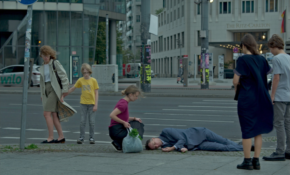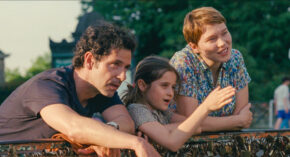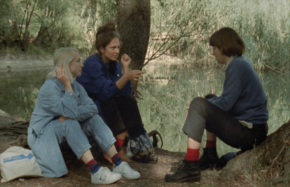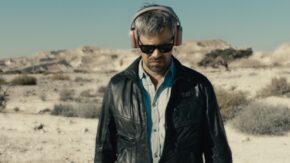Germany
The Practice (Martín Rejtman, Argentina/Chile/Germany/Portugal)
By Haden Guest | 01/17/2024 | CS97, Currency, From Cinema Scope Magazine
The latest film by Martín Rejtman reaffirms his singular place in Argentine and world cinema as one of the rare non-mainstream auteurs working today, with brio and invention, in the realm of comedy.
Read More → TIFF 2023 | Fallen Leaves (Aki Kaurismäki, Finland/Germany) — Centrepiece
By Jordan Cronk | 09/05/2023 | Cinema Scope Online, CS95, TIFF 2023
At 81 minutes, Aki Kaurismäki’s Fallen Leaves was the shortest film in a bloated Cannes competition. It was also among the best, accomplishing more with less (and in less time) than any number of overwrought productions, a notion evidently shared by at least some members of Ruben Östlund’s jury, which awarded the film its namesake third runner-up prize, making this only the second honour Kaurismäki’s received from Cannes after winning the Grand Prix for The Man Without a Past in 2002.
Read More → TIFF 2023 | Kidnapped (Marco Bellocchio, Italy/France/Germany) — Special Presentations
By Manuela Lazic | 09/05/2023 | Cinema Scope Online, TIFF 2023
After The Traitor (2019) and the series Exterior Night (2022), Marco Bellocchio, aged 83, continues to explore the darker stories in Italy’s past. With Kidnapped, he turns to the sins of the Catholic church in the 19th century with the true story of young Edgardo Mortara (played beautifully as a child by Enea Sala), who was taken away from his Jewish family after it was discovered that his Catholic nurse had secretly baptized him when he was ill, fearing for his soul.
Read More → TIFF 2023 | Music (Angela Schanelec, Germany/France/Serbia) — Wavelengths
By Phil Coldiron | 09/05/2023 | Cinema Scope Online, CS94, TIFF 2023
The compositional tropes of various high modernists, Bresson above all, loom large. Schanelec’s invention, instead, is tonal, a chording of irony and earnestness which allows her to handle the hottest emotions without ever being burned. Taken in other terms, this too looks more like refinement than invention: she is alone among her contemporaries in her capacity to reconcile the Apollonian and the Dionysian.
Read More → TIFF 2023 | Perfect Days (Wim Wenders, Japan/Germany) — Centrepiece
By Beatrice Loayza | 09/05/2023 | Cinema Scope Online, CS96, Currency, From Cinema Scope Magazine, TIFF 2023
Is Wim Wenders back? If he is, I’m not sure it’s such a good thing. Perfect Days, the tenth film by the German director to compete at Cannes, is a working-class yarn about the pleasantly banal routines of a toilet cleaner named Hirayama (Yakusho Koji), a beguiling loner with a beautiful soul who is harbouring a trauma that is never fully articulated by the film. Sound familiar?
Read More → TIFF 2023 | The Teachers’ Lounge (Ilker Çatak, Germany) — Centrepiece
By Josh Lewis | 09/05/2023 | Cinema Scope Online, TIFF 2023
The hermetic, ensemble classroom setting has long served as an easy access point for filmmakers to make microcosmic sociological observations about The State of Things, or locate that particularly stressful, malleable time when people are typically having their first experiences with complex adult interactions, institutional politics, and rebellion.
Read More → Festivals | Berlin: Claire Simon’s Notre corps
By Beatrice Loayza | 03/24/2023 | CS94, Festivals, From Cinema Scope Magazine
Claire Simon’s Notre corps—which captures the visitations and procedures in the gynecological ward of Paris’s Tenon hospital, a public institution located a few blocks from Père Lachaise—understands this compromise, but offers a rebuttal as well: it honours the body’s possibilities and delicate particularities by expanding that gaze to encompass the lives beyond the bodies, the unique frictions engendered by supposedly objective methods.
Read More → Un beau matin (Mia Hansen-Løve, France/UK/Germany)
By Holden Seidlitz | 03/24/2023 | CS94, Currency, From Cinema Scope Magazine
...there are instances where autofiction permits storytellers to forget the structural demands of narrative, a fate which befalls the French filmmaker Mia Hansen-Løve in her latest feature, Un beau matin,whose pat ending doesn’t suit her characters so much as her own memory.
Read More → Festivals: Berlin | A Flower in the Mouth (Éric Baudelaire, South Korea/France/Germany)
By Deragh Campbell | 03/21/2022 | CS90, Festivals, From Cinema Scope Magazine
Screening in this year’s Berlinale Forum, Éric Baudelaire's unique take on Luigi Pirandello’s 1923 short play The Man with the Flower in His Mouth assumes the form of a diptych: the first part is an observational documentary of Bloemenveiling Aalsmeer, the world’s largest flower market in the Netherlands; the second, a fictional, more explicit adaptation of Pirandello’s text, a conversation taking place over an evening in a Paris bar.
Read More → Outside Noise (Ted Fendt, Germany/South Korea/Austria)
By Lawrence Garcia | 01/04/2022 | CS89, Fall Festival Spotlight, Festivals, From Cinema Scope Magazine, Spotlight
In 1984, the American philosopher and art critic Arthur C. Danto articulated a theory of the end of art. His claim—entirely distinct from declarations of the death of art—was not that art would no longer continue to be produced, but rather that there was no longer any “special way works of art have to be.”
Read More → Ahed’s Knee (Nadav Lapid, France/Israel/Germany)
By James Lattimer | 09/20/2021 | CS88, Festivals, From Cinema Scope Magazine, Spotlight
might leave a bigger scar. The Kindergarten Teacher (2014) and Synonyms (2019) already flirted with autobiography, but his fourth feature pushes forward into full autofiction, sending a director named Y. (Avshalom Pollak) to the Arava desert for a screening of one of his films, only to discover that open discussion of its content is frowned upon.
Read More → Siberia (Abel Ferrara, Italy/Germany/Mexico/Greece/UK)
By Michael Sicinski | 06/15/2021 | CS87, Currency, From Cinema Scope Magazine
Abel Ferrara is a changed man. While the evidence suggests that this is very good news for Ferrara himself and his immediate family, it could result in a minor schism in the manner in which his films are received. For most of his career Ferrara has been the subject of a Romantic cult that glorified his legendarily self-destructive behaviour, and often read this (literal) lawlessness as an integral part of his renegade creative vision.
Read More → Transit (Christian Petzold, Germany/France)
By James Lattimer | 09/28/2018 | CS76, Currency, From Cinema Scope Magazine
By James Lattimer Christian Petzold’s progressive drift away from realism gathers pace in Transit, another melodrama of impossibility and despair that unfolds in a hyper-constructed amalgam of past and present as unstable as it is seamless. Yet the deliberately unresolved tension between ’40s Marseille and today is hardly the only element of slippage in the…
Read More → Passion (Brian De Palma, France/Germany)
By Andrew Tracy | 03/20/2013 | CS54, Currency, From Cinema Scope Magazine
By Andrew Tracy Allow for the possibility that perspective can trump prejudice, I suppose. Eight months after seeing Brian De Palma’s Passion and thinking it ludicrous (probably intentional) and dreadful (presumably not), I’ve since scaled it back to the former—though the fact that it isn’t dreadful does not ipso facto mean it’s any fucking good.…
Read More → 















